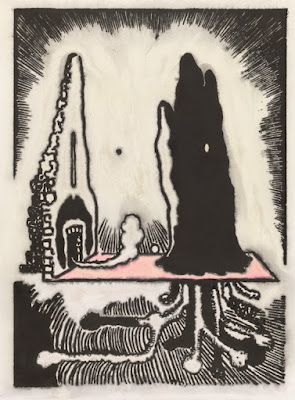-The-Window-1956-oil-on-board-Art-Gallery-of-New-South-Wales-Sydney.jpg) |
| Grace Cossington Smith The Window 1956 oil on board Art Gallery of New South Wales, Sydney |
-Interior-c1949-50-drawing-(colored-pencils)-National-Gallery-of-Australia-Canberra.jpg) |
| Grace Cossington Smith Interior ca, 1949-50 drawing (colored pencils) National Gallery of Australia, Canberra |
-Landscape-at-Pentecost-1929-oil-on-board-Art-Gallery-of-South-Australia-Adelaide.png) |
| Grace Cossington Smith Landscape at Pentecost 1929 oil on board Art Gallery of South Australia, Adelaide |
-The-Reader-1916-oil-on-canvas-Art-Gallery-of-New-South-Wales-Sydney.jpg) |
| Grace Cossington Smith The Reader 1916 oil on canvas Art Gallery of New South Wales, Sydney |
 |
| Benjamin Armstrong Embedded 2018 hand-colored linocut National Gallery of Australia, Canberra |
 |
| Benjamin Armstrong Leichhardt's Arrival 2018 hand-colored linocut National Gallery of Australia, Canberra |
 |
| Benjamin Armstrong Planning 2018 hand-colored linocut National Gallery of Australia, Canberra |
 |
| Benjamin Armstrong World's End 2018 hand-colored linocut National Gallery of Australia, Canberra |
 |
| Hilda Rix Nicholas Italian Sculptress ca. 1916 drawing National Gallery of Australia, Canberra |
 |
| Hilda Rix Nicholas Les Fleurs Dédaignées 1925 oil on canvas National Gallery of Australia, Canberra |
-Dorothy-Richmond-1924-oil-on-canvas-National-Gallery-of-Australia-Canberra.jpg) |
| Hilda Rix Nicholas The Mirror: Dorothy Richmond 1924 oil on canvas National Gallery of Australia, Canberra |
 |
| Hilda Rix Nicholas Une Australienne 1926 oil on canvas National Gallery of Australia, Canberra |
 |
| William Nicholson Portrait of J.W. Simpson 1892 lithograph Art Gallery of Greater Victoria, British Columbia |
 |
| William Nicholson Portrait of James McNeill Whistler 1898 lithograph National Gallery of Australia, Canberra |
 |
| William Nicholson Roses and Poppies in Silver Jug 1938 oil on canvas Beaverbrook Art Gallery, Fredericton, New Brunswick |
-1932-oil-on-canvas-Art-Gallery-of-New-South-Wales-Sydney.jpg) |
| William Nicholson The Poet at Annecy (Geoffrey Taylor) 1932 oil on canvas Art Gallery of New South Wales, Sydney |
Voltaire at Ferney
Almost happy now, he looked at his estate,
An exile making watches glanced up as he passed,
And went on working; where a hospital was rising fast
A joiner touched his cap; an agent came to tell
Some of the trees he'd planted were progressing well.
The white alps glittered. It was summer. He was very great.
Far-off in Paris, where his enemies
Whispered that he was wicked, in an upright chair
A blind old woman longed for death and letters. He would write
"Nothing is better than life." But was it? Yes, the fight
Against the false and the unfair
Was always worth it. So was gardening. Civilise.
Cajoling, scolding, scheming, cleverest of them all,
He'd led the other children in a holy war
Against the infamous grown-ups, and, like a child, been sly
And humble when there was occasion for
The two-faced answer or the plain protective lie,
But, patient like a peasant, waited for their fall.
And never doubted, like D'Alembert, he would win:
Only Pascal was a great enemy, the rest
Only Pascal was a great enemy, the rest
Were rats already poisoned; there was much, though, to be done,
And only himself to count upon.
Dear Diderot was dull but did his best,
Rousseau, he'd always known, would blubber and give in.
So, like a sentinel, he could not sleep. The night was full of wrong,
Earthquakes and executions. Soon he would be dead.
And still all over Europe stood the horrible nurses
Itching to boil their children. Only his verses
Perhaps could stop them. He must go on working. Overhead
The uncomplaining stars composed their lucid song.
– W.H. Auden (1939)